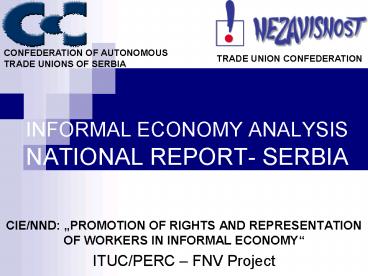INFORMAL ECONOMY ANALYSIS NATIONAL REPORT- SERBIA - PowerPoint PPT Presentation
Title:
INFORMAL ECONOMY ANALYSIS NATIONAL REPORT- SERBIA
Description:
confederation of autonomous trade unions of serbia trade union confederation informal economy analysis national report- serbia cie/nnd: promotion of rights and ... – PowerPoint PPT presentation
Number of Views:88
Avg rating:3.0/5.0
Title: INFORMAL ECONOMY ANALYSIS NATIONAL REPORT- SERBIA
1
INFORMAL ECONOMY ANALYSIS NATIONAL REPORT- SERBIA
CONFEDERATION OF AUTONOMOUS TRADE UNIONS OF
SERBIA
TRADE UNION CONFEDERATION
- CIE/NND PROMOTION OF RIGHTS AND REPRESENTATION
OF WORKERS IN INFORMAL ECONOMY - ITUC/PERC FNV Project
2
PART 1 GENERAL OVERVIEW
- The division of labour market in the Republic of
Serbia on formal and informal became
significantly recognizable during 1990s when, due
to deep economic crisis, the informal economy
became the only survival method for the major
part of population. - The state tolerated this phenomenon in order to
lessen strong social tensions, therefore, the
informal economy remained fairly strong in our
region even after the achievement of relative
economic stability.
3
The participants in the informal economy are
mostly employed persons whose income is not
sufficient to provide them with funds necessary
for their existence and the existence of their
families. - The other groups of participants in
informal economy include unemployed, pensioners,
students and refugees.
- The participants in the informal economy
4
PART 2 CONTROL OF ILLEGAL WORK
- The informal economy is mostly spread in
construction, trade, services, i.e. small
clothing shops, cafes, small handcraft shops and
agriculture. Those are mostly poor-quality,
temporary jobs performed under bad working
conditions and without protection at the work
place. - The control of illegal work was conducted in
2006, and a special emphasis was placed on
employers in trade, catering, construction and
handcraft sectors. During the control period, 51
995 inspections were conducted ex officio. The
number of 16 205 illegal workers was detected. - After the inspection the labour relations with 11
309 persons were legalized through signing of
employment agreements. Better coordination of
activities between different inspectorates is
necessary in order to increase the effectiveness
of inspection services.
5
- When we take a look at the number of
municipalities in which more than 10 of total
product of the municipality is being created in
the grey zone, the trade is on the top of the
list with 31.37. - The second on the list is
the agriculture, where grey economy participates
in more than 10 of total activities in every
fourth municipality in the Republic. Textile
industry is also represented in grey economy with
28, food industry with 19.5, construction
material with 13, and trade in cigarettes,
electronic devices, car spare parts and
furniture with 11. - Over the period from
January 1 through December 21, 2007 there were 26
work-related deaths, 17 severe injuries which
resulted in death, 1046 grave injuries and 27
collective injuries at work.
6
PART 2 REGULATION
- In accordance with the national legislation in
Serbia, informal economy includes all workers
employed at unregulated and unprotected
positions, employees in unregistered companies,
paid workers doing informal activities, etc.
7
DEFINES INFORMAL ECONOMY
- Economic Sciences Institute in Serbia defines
informal economy as a wide range of economic
activities or transactions conducted in manners
that do not respect legal norms which are
contributing to official GDP. Grey economy
includes economic activities outside of regulated
legal standards (informal economy) or those that
are in opposition to legal regulations (illegal
economy). Informal economy represents legal
activities which are due to different reasons
hidden from administrative and tax bodies.
8
TRADE UNIONS
- The trade unions are emphasizing that this issue
needs to be resolved through tripartite approach
and social dialogue, and that it needs to be
placed in the focus of Social-economic Council,
on the level of the Republic as well as on local
levels. The labour market reform and education
system reform are also required, as well as
defining of social policy which will contribute
to the promotion of employment and increase in
employment level.
9
INSPECTION
- There are 40 inspection services which exist
within 16 state bodies with the total number of
around six thousands inspectors. This figure
looks very impressive for different reasons, but
it is not so impressive from the perspective of
practical fight against informal economy.
10
SOCIAL PARTNERSHIP
- Activities planned for reduction and gradual
elimination of informal work must be of interest
not only for trade unions (protection of workers
rights and better social position of the
employees), but also for the employers
(elimination of unfair competition) and for state
(increase of budget). In this way we will realize
full social partnership in those activities.
11
How to achieve that
- through institutional forms of social dialogue
(SES on all levels, tripartite bodies) - cooperation with executive authorities at all
levels - cooperation with political parties
- cooperation with non-governmental and other civil
society organizations - lobbying with different political representative
groups - actions in Parliament (observer role)
- permanent, wide and levelled education and
building of capacities of leaders and trade union
members - through transparent activities
- raising of awareness and knowledge on seriousness
of this problem with all segments of society
employees, trade unions, employers, public and
state - support to legislative and regulative framework
which would resolve this problem - education and provision of assistance to
employees in informal sector - instigation of collective representation,
transfer from informal to formal sphere and
organization into trade unions - planning and implementation of campaigns.































